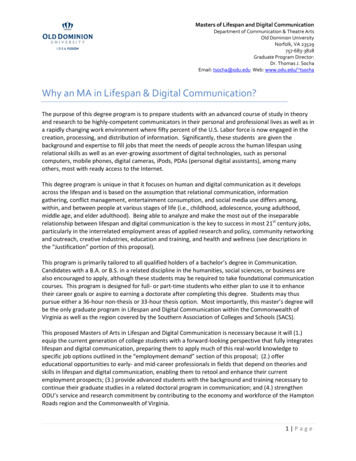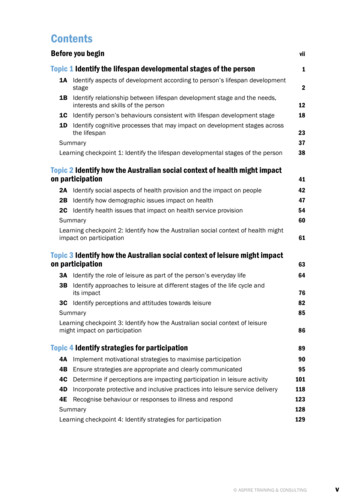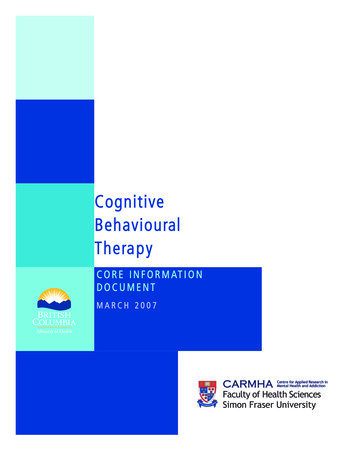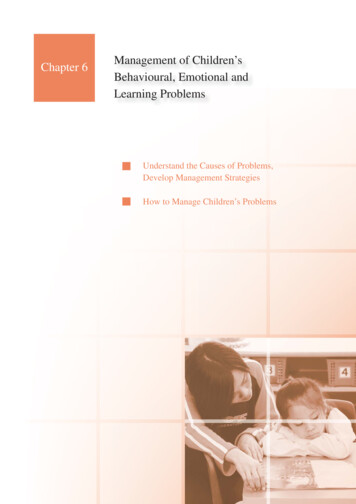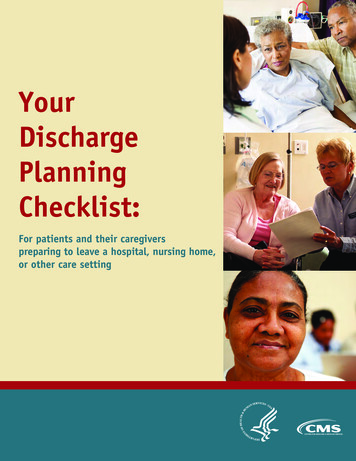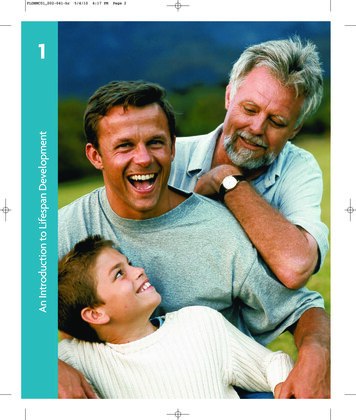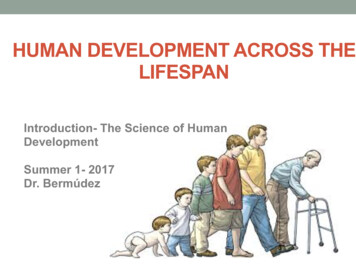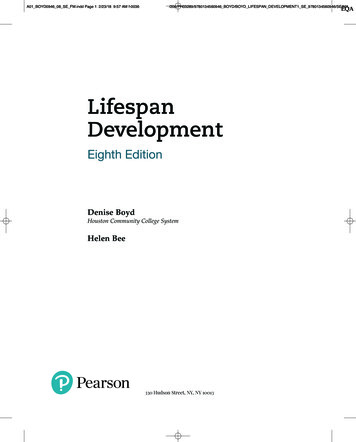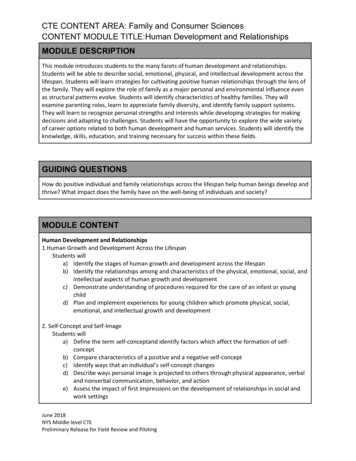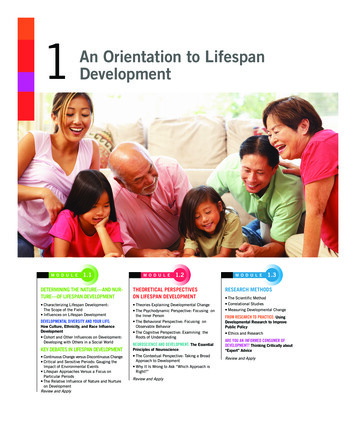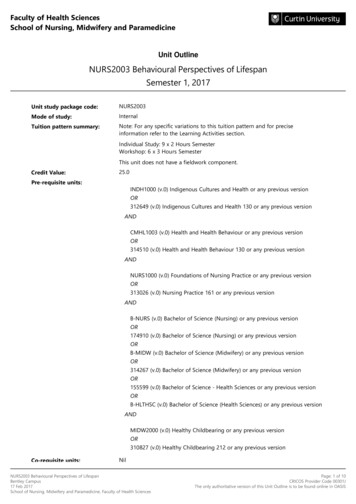
Transcription
Faculty of Health SciencesSchool of Nursing, Midwifery and ParamedicineUnit OutlineNURS2003 Behavioural Perspectives of LifespanSemester 1, 2017 Unit study package code:NURS2003Mode of study:InternalTuition pattern summary:Note: For any specific variations to this tuition pattern and for preciseinformation refer to the Learning Activities section.Individual Study: 9 x 2 Hours SemesterWorkshop: 6 x 3 Hours SemesterThis unit does not have a fieldwork component.Credit Value:25.0Pre-requisite units:INDH1000 (v.0) Indigenous Cultures and Health or any previous versionOR312649 (v.0) Indigenous Cultures and Health 130 or any previous versionANDCMHL1003 (v.0) Health and Health Behaviour or any previous versionOR314510 (v.0) Health and Health Behaviour 130 or any previous versionANDNURS1000 (v.0) Foundations of Nursing Practice or any previous versionOR313026 (v.0) Nursing Practice 161 or any previous versionANDB-NURS (v.0) Bachelor of Science (Nursing) or any previous versionOR174910 (v.0) Bachelor of Science (Nursing) or any previous versionORB-MIDW (v.0) Bachelor of Science (Midwifery) or any previous versionOR314267 (v.0) Bachelor of Science (Midwifery) or any previous versionOR155599 (v.0) Bachelor of Science - Health Sciences or any previous versionORB-HLTHSC (v.0) Bachelor of Science (Health Sciences) or any previous versionANDMIDW2000 (v.0) Healthy Childbearing or any previous versionOR310827 (v.0) Healthy Childbearing 212 or any previous versionCo-requisite units:NilNURS2003 Behavioural Perspectives of LifespanBentley Campus17 Feb 2017School of Nursing, Midwifery and Paramedicine, Faculty of Health SciencesPage: 1 of 10CRICOS Provider Code 00301JThe only authoritative version of this Unit Outline is to be found online in OASIS
Faculty of Health SciencesSchool of Nursing, Midwifery andParamedicineAnti-requisite units:NilResult type:Grade/MarkApproved incidental fees:Information about approved incidental fees can be obtained from our website.Visit fees.curtin.edu.au/incidental fees.cfm for details.Unit tation times:DrGarth Kendall08 9266 2191G.Kendall@curtin.edu.auBuilding: 405 - Room: 426By appointmentTeaching Staff:Name:Phone:Email:Location:Dr Anna Fagence08 9266 2980anna.fagence@curtin.edu.auBuilding: 405 - Room: 420Administrative contact:Name:Phone:Email:Location:School Student Support Office08 9266 ng: 405 - Room: Level 3 ReceptionLearning Management System:Blackboard (lms.curtin.edu.au)Acknowledgement of CountryWe respectfully acknowledge the Indigenous Elders, custodians, their descendants and kin of this land past andpresent. The Centre for Aboriginal Studies aspires to contribute to positive social change for Indigenous Australiansthrough higher education and research.SyllabusStages of development within the life course with reference to biological, psychological, including emotional andcognitive, and social capabilities. Sociocultural perspectives on development and significant life events andapplication to nursing, midwifery and paramedic practice. Concepts of: gene-expression, brain plasticity, stressreactivity, emotional, attention, social regulation, cognition, adaptability, agency, context and structure with referenceto the stable and unstable person. The dynamic nature of family and social relationships and their impact onindividuals and families. .NURS2003 Behavioural Perspectives of LifespanBentley Campus17 Feb 2017School of Nursing, Midwifery and Paramedicine, Faculty of Health SciencesPage: 2 of 10CRICOS Provider Code 00301JThe only authoritative version of this Unit Outline is to be found online in OASIS
Faculty of Health SciencesSchool of Nursing, Midwifery andParamedicineIntroductionWelcome to Behavioural Perspectives of Lifespan – Life course developmentThe aim of this Unit is to introduce you to the complex interplay between the biological, psychological and socialprocesses that drive human development from the time before conception starts. You will develop an understandingthat comes from theory and research-based knowledge in a broad range of disciplines, including: genetics,neuroscience, developmental physiology, medicine, epidemiology, psychology, sociology, anthropology, nursing,economics, history, demography, and education.Most developmental scientists today adopt a developmental systems perspective. They welcome input from everytheory. They realise that many interacting influences shape who we are. They understand that diversity among peopleand change processes are the essence of development. This Unit outlines a number of contemporary issues facingindividuals and families in a variety of sociocultural contexts.Following an introduction to the contexts of development, influential theories and research methods, you will explorethe very beginnings of existence, the earliest years of life where many biological, psychological and social processesare formed, the exciting primary school years, the high powered periods of adolescence and early adulthood, thelater adult years, and old age. During your journey of discovery across the life course you will question why someindividuals and families from some cultural and socioeconomic groups struggle to achieve optimal developmentaloutcomes. You will also question why many individuals with disabilities and chronic health problems aredisadvantaged in even the wealthiest of social settings.You are expected to log onto the Blackboard site for this unit every week. Waiting online will be a series of 12modules containing lecture notes, i-lectures, readings, and learning activities. You will also be required to attend sixworkshops of three hours duration each. The workshops will further explore the concepts covered in the lectures,readings and other materials.Unit Learning OutcomesAll graduates of Curtin University achieve a set of nine graduate attributes during their course of study. These tell anemployer that, through your studies, you have acquired discipline knowledge and a range of other skills andattributes which employers say would be useful in a professional setting. Each unit in your course addresses thegraduate attributes through a clearly identified set of learning outcomes. They form a vital part in the processreferred to as assurance of learning. The learning outcomes tell you what you are expected to know, understand orbe able to do in order to be successful in this unit. Each assessment for this unit is carefully designed to test yourachievement of one or more of the unit learning outcomes. On successfully completing all of the assessments you willhave achieved all of these learning outcomes.Your course has been designed so that on graduating we can say you will have achieved all of Curtin's GraduateAttributes through the assurance of learning process in each unit.On successful completion of this unit students can:Graduate Attributesaddressed1 Describe psychological, emotional and cognitive, and social capabilities within the lifecourse2 Discuss social and cultural interpretations of significant life events3 Analyse the dynamic nature of family and social relationships through the life cycle4 Critically evaluate behavioural health science perspectives, including the biopsychosocialframework, on life stages and development for individuals and familiesNURS2003 Behavioural Perspectives of LifespanBentley Campus17 Feb 2017School of Nursing, Midwifery and Paramedicine, Faculty of Health SciencesPage: 3 of 10CRICOS Provider Code 00301JThe only authoritative version of this Unit Outline is to be found online in OASIS
Faculty of Health SciencesSchool of Nursing, Midwifery andParamedicineCurtin's Graduate AttributesApply discipline knowledgeThinking skillsInformation skills(use analytical skills to solve problems)(confidence to investigate new ideas)Communication skillsTechnology skillsInternational perspectiveCultural understanding(value the perspectives of others)(value the perspectives of others)Learning how to learn(apply principles learnt to new situations)(confidence to tackle unfamiliar problems)Professional Skills(work independently and as a team)(plan own work)Find out more about Curtin's Graduate attributes at the Office of Teaching & Learning website: ctl.curtin.edu.auLearning ActivitiesStudents are required to attend a three hour workshop in weeks 1, 2, 9, and 14 and either weeks 4 and 11 or weeks 6and 13 depending on clinical placement. The workshops in weeks 1 and 2 will include guided discussion as well asinteractive learning activities. The workshops in weeks 4, 6, 9, 11, and 13 will comprise student group presentationsas well as guided discussion and interactive learning activities. The final workshop in week 14 will include studentpresentations and exam preparation. Presentations will be graded by the tutor and fellow students and willcontribute to the unit assessment.Students are also required to log-on to the Blackboard site for the unit every week. Waiting online will be a series of12 modules, each of which contains an introduction to the topic, lecture notes, readings, and learning activities. Fourof the modules also contain a link to an i-lecture, each of which covers the material presented in 2 of the modules. Asa minimum, students are required to read the relevant chapters of the text book (Belsky) and suggested journalarticles. To enhance their learning and understanding, students may also undertake weekly reading of additionalrelevant publications and learning activities. The weekly tlearning activities are designed to allow students to explorethe concepts detailed in the lectures and readings. In addition students are encouraged to visit the Belsky textbookwebsite (LaunchPad) where they will find many more interactive learning materials. Access to the Belsky website canbe purchased along with the textbook for a small additional fee.Learning ResourcesLibrary Reading ListThe Reading List for this unit can be accessed through Blackboard.Essential textsThe required textbook(s) for this unit are:lBelsky, J. (2016). Experiencing the lifespan (3rd or 4th Edition). New York: Worth.(ISBN/ISSN: 9781319061661)Other resourcesLaunchPad: e/4636257NURS2003 Behavioural Perspectives of LifespanBentley Campus17 Feb 2017School of Nursing, Midwifery and Paramedicine, Faculty of Health SciencesPage: 4 of 10CRICOS Provider Code 00301JThe only authoritative version of this Unit Outline is to be found online in OASIS
Faculty of Health SciencesSchool of Nursing, Midwifery andParamedicineAssessmentAssessment scheduleTaskValue %3Unit LearningOutcome(s)AssessedGroup presentation20 percentWeek: 4, 6, 9, 11, 13, 1,2,3,4or 14Day: In workshoptimeTime: In workshoptimeCase study40 percentWeek: 103,4Day: Friday 5th MayTime: 4:30pmExamination40 percentWeek: 12th-23th June 1,2Day: TBATime: TBA12Date DueDetailed information on assessment tasks1. Group PresentationWorth: 20%Due: During one of the workshops (Teaching weeks 4, 6, 9, 11, 13, or 14)Length: 10 minutes plus 5 minutes for questions and discussionRequirements:This is a group activity. Groups will be formed during Workshop 1. Each group will be asked to choose one ofthe readings listed in Blackboard and will be responsible for summarising the article and presenting an outlineof the issue during a 10 minute presentation and 5 minute discussion. The articles focus on aspects of lifecourse development from before conception to old age. Comprehensive instructions and marking guides areavailable on Blackboard.2. Case StudyWorth: 40%Consent Due: 4:30pm, Friday 17th March (Week 3)Report Due: 4:30pm Friday 5th May (Week 10)Length: 2,000 words plus references and appendicesRequirements:This is an individual project. Students will be required to employ research methods, such as naturalisticobservation, informal interaction, and a semi-structured interview, to collect data on a child, adolescent, orolder adult. The purpose of the project is to link recent research literature about development during aparticular time in the life course to a real person. Comprehensive instructions, the consent form, andmarking rubric are available on Blackboard. N.B. A hard copy signed consent form must be placed in theUnit Coordinator’s mailbox by 4:30pm, Friday 17th March.3. Multiple Choice ExaminationWorth: 40%Due: The Final Examination will be held during the formal examination period between 12th and 23thJune. It is your responsibility to check the date, time and location of the Final Examination. These details will bepublished on the university website (http://curtin.edu.au/students/dates) and then announced duringWorkshop sessions and on Blackboard after this date. University policy does not allow information regardingthe examination timetable to be given over the telephone. Students must ensure that they will be in Perthfor their examinations – do not organise to leave Perth during the examination period.Length: 2 hours – 100 multiple choice questions.Aids: No aids will be allowed. This will be a closed book test.NURS2003 Behavioural Perspectives of LifespanBentley Campus17 Feb 2017School of Nursing, Midwifery and Paramedicine, Faculty of Health SciencesPage: 5 of 10CRICOS Provider Code 00301JThe only authoritative version of this Unit Outline is to be found online in OASIS
Faculty of Health SciencesSchool of Nursing, Midwifery andParamedicinePass requirementsStudents must attempt all assessment tasks. Students must obtain a mark of 50% or greater in at least two (2)assessment tasks AND a total mark of 50% or greater to pass the unit.Fair assessment through moderationModeration describes a quality assurance process to ensure that assessments are appropriate to the learningoutcomes, and that student work is evaluated consistently by assessors. Minimum standards for the moderation ofassessment are described in the Assessment and Student Progression Manual, available rning.cfmLate assessment policyThis ensures that the requirements for submission of assignments and other work to be assessed are fair,transparent, equitable, and that penalties are consistently applied.1.2.All assessments students are required to submit will have a due date and time specified on this Unit Outline.Students will be penalised by a deduction of ten percent per calendar day for a late assessment submission(e.g. a mark equivalent to 10% of the total allocated for the assessment will be deducted from the markedvalue for every day that the assessment is late). This means that an assessment worth 20 marks will have twomarks deducted per calendar day late. Hence if it was handed in three calendar days late and given a mark of16/20, the student would receive 10/20. An assessment more than seven calendar days overdue will not bemarked and will receive a mark of 0.Assessment extensionA student unable to complete an assessment task by/on the original published date/time (e.g. examinations, tests) ordue date/time (e.g. assignments) must apply for an assessment extension using the Assessment Extension form(available from the Forms page at students.curtin.edu.au/administration/) as prescribed by the Academic Registrar. Itis the responsibility of the student to demonstrate and provide evidence for exceptional circumstances beyond thestudent's control that prevent them from completing/submitting the assessment task.The student will be expected to lodge the form and supporting documentation with the unit coordinator before theassessment date/time or due date/time. An application may be accepted up to five working days after the date ordue date of the assessment task where the student is able to provide an acceptable explanation as to why he or shewas not able to submit the application prior to the assessment date. An application for an assessment extension willnot be accepted after the date of the Board of Examiners' meeting.Deferred assessmentsIf your results show that you have been granted a deferred assessment you should immediately check OASIS fordetails.Deferred examinations/tests will be held from 14/07/2017 to 14/07/2017 . Notification to students will be made afterthe Board of Examiners’ meeting via the Official Communications Channel (OCC) in OASIS.Supplementary assessmentsSupplementary assessments are not available in this unit.NURS2003 Behavioural Perspectives of LifespanBentley Campus17 Feb 2017School of Nursing, Midwifery and Paramedicine, Faculty of Health SciencesPage: 6 of 10CRICOS Provider Code 00301JThe only authoritative version of this Unit Outline is to be found online in OASIS
Faculty of Health SciencesSchool of Nursing, Midwifery andParamedicineReasonable adjustments for students with disabilities/health circumstances likely to impact onstudiesA Curtin Access Plan (CAP) is a document that outlines the type and level of support required by a student with adisability or health condition to have equitable access to their studies at Curtin. This support can include alternativeexam or test arrangements, study materials in accessible formats, access to Curtin’s facilities and services or othersupport as discussed with an advisor from Disability Services (disability.curtin.edu.au). Documentation is requiredfrom your treating Health Professional to confirm your health circumstances.If you think you may be eligible for a CAP, please contact Disability Services. If you already have a CAP please provideit to the Unit Coordinator at the beginning of each study period.Referencing styleThe referencing style for this unit is APA 6th Ed.More information can be found on this style from the Library web ncing.Copyright Curtin University. The course material for this unit is provided to you for your own research and study only. It issubject to copyright. It is a copyright infringement to make this material available on third party websites.Academic Integrity (including plagiarism and cheating)Any conduct by a student that is dishonest or unfair in connection with any academic work is considered to beacademic misconduct. Plagiarism and cheating are serious offences that will be investigated and may result inpenalties such as reduced or zero grades, annulled units or even termination from the course. Assessments underinvestigation will not be given a mark until the matter is concluded. This may result in the unit grade being withheldor a grade of Fail Incomplete (F-IN) until a decision has been made by the Student Disciplinary Panel. This mayimpact on enrolment in further units/study periods.Plagiarism occurs when work or property of another person is presented as one's own, without appropriateacknowledgement or referencing. Submitting work which has been produced by someone else (e.g. allowing orcontracting another person to do the work for which you claim authorship) is also plagiarism. Submitted work issubjected to a plagiarism detection process, which may include the use of text matching systems or interviews withstudents to determine authorship.Cheating includes (but is not limited to) asking or paying someone to complete an assessment task for you or anyuse of unauthorised materials or assistance during an examination or test.From Semester 1, 2016, all incoming coursework students are required to complete Curtin’s Academic IntegrityProgram (AIP). If a student does not pass the program by the end of their first study period of enrolment at Curtin,their marks will be withheld until they pass. More information about the AIP can be found s/AIP.cfmRefer to the Academic Integrity tab in Blackboard or academicintegrity.curtin.edu.au for more information, includingstudent guidelines for avoiding plagiarism.NURS2003 Behavioural Perspectives of LifespanBentley Campus17 Feb 2017School of Nursing, Midwifery and Paramedicine, Faculty of Health SciencesPage: 7 of 10CRICOS Provider Code 00301JThe only authoritative version of this Unit Outline is to be found online in OASIS
Faculty of Health SciencesSchool of Nursing, Midwifery andParamedicineInformation and Communications Technology (ICT) ExpectationsCurtin students are expected to have reliable internet access in order to connect to OASIS email and learning systemssuch as Blackboard and Library Services.You may also require a computer or mobile device for preparing and submitting your work.For general ICT assistance, in the first instance please contact OASIS Student rt.cfmFor specific assistance with any of the items listed below, please contact The Learning g centre.htmllUsing Blackboard, the I Drive and Back-Up filesIntroduction to PowerPoint, Word and ExcelAdditional informationEnrolmentIt is your responsibility to ensure that your enrolment is correct - you can check your enrolment through the eStudentoption on OASIS, where you can also print an Enrolment Advice.Student Rights and ResponsibilitiesIt is the responsibility of every student to be aware of all relevant legislation, policies and procedures relating to theirrights and responsibilities as a student. These include:lllllthe Student CharterValues and Signature Behavioursthe University's policy and statements on plagiarism and academic integritycopyright principles and responsibilitiesthe University's policies on appropriate use of software and computer facilitiesInformation on all these things is available through the University's "Student Rights and Responsibilities" website at:students.curtin.edu.au/rights.Student EquityThere are a number of factors that might disadvantage some students from participating in their studies orassessments to the best of their ability, under standard conditions. These factors may include a disability or medicalcondition (e.g. mental illness, chronic illness, physical or sensory disability, learning disability), significant familyresponsibilities, pregnancy, religious practices, living in a remote location or another reason. If you believe you maybe unfairly disadvantaged on these or other grounds please contact Student Equity at eesj@curtin.edu.au or go tohttp://eesj.curtin.edu.au/student equity/index.cfm for more informationYou can also contact Counselling and Disability services: http://www.disability.curtin.edu.au or the Multi-faith being/about multifaith services.htm for further information.It is important to note that the staff of the university may not be able to meet your needs if they are not informed ofyour individual circumstances so please get in touch with the appropriate service if you require assistance. Forgeneral wellbeing concerns or advice please contact Curtin's Student Wellbeing Advisory Service student wellbeing service.htmNURS2003 Behavioural Perspectives of LifespanBentley Campus17 Feb 2017School of Nursing, Midwifery and Paramedicine, Faculty of Health SciencesPage: 8 of 10CRICOS Provider Code 00301JThe only authoritative version of this Unit Outline is to be found online in OASIS
Faculty of Health SciencesSchool of Nursing, Midwifery andParamedicineRecent unit changesStudents are encouraged to provide unit feedback through eVALUate, Curtin's online student feedback system. Formore information about eVALUate, please refer to evaluate.curtin.edu.au/info/.To view previous student feedback about this unit, search for the Unit Summary Report athttps://evaluate.curtin.edu.au/student/unit search.cfm. Seehttps://evaluate.curtin.edu.au/info/dates.cfm to find out when you can eVALUate this unit.Recent changes to this unit include:The reading list has been updatedStudents now have access to an interactive wesite resource called LaunchPadNURS2003 Behavioural Perspectives of LifespanBentley Campus17 Feb 2017School of Nursing, Midwifery and Paramedicine, Faculty of Health SciencesPage: 9 of 10CRICOS Provider Code 00301JThe only authoritative version of this Unit Outline is to be found online in OASIS
Faculty of Health SciencesSchool of Nursing, Midwifery andParamedicineProgram calendarNURS2003 Behavioural Perspectives of LifespanBentley Campus17 Feb 2017School of Nursing, Midwifery and Paramedicine, Faculty of Health SciencesPage: 10 of 10CRICOS Provider Code 00301JThe only authoritative version of this Unit Outline is to be found online in OASIS
Curtin's Graduate Attributes Learning Activities Students are required to attend a three hour workshop in weeks 1, 2, 9, and 14 and either weeks 4 and 11 or weeks 6
